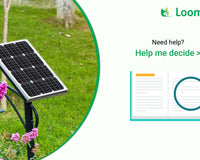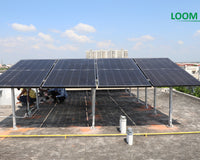The government announced a 40% subsidy for up to 3 kW system but it was difficult to get funds due to the pandemic. The subsidy is available for residential homeowners who install on-grid solar systems. It is provided by the state discom company after submitting the complete installation documents on their portal.
The Jharkhand government (JREDA) is providing a 40% solar subsidy in the state of Jharkhand directly to the residential customers through its approved local channel partners. As per the deal, solar subsidy is available only for on-grid solar power plants and no subsidies are available in hybrid or offgrid plants. You should be the homeowner to avail the subsidy. If you are a tenant, you may avail the subsidy on behalf of your homeowner.
Components of a Solar System
Solar Panels: Solar panels are the heart of any solar system. These panels are made up of photovoltaic cells that convert sunlight into electricity. Solar panels come in many variants like DCR solar panels, monocrystalline solar panels, and bifacial solar panels. The most prominent choice is bifacial solar panel for residential purpose.
Solar Inverter: Solar panels generate direct current (DC) electricity, but most of our household appliances use alternating current (AC). So, we need a solar inverter to convert DC into AC. On grid solar inverters are a crucial part of the system, they come in different sizes 3KW, 5 KW, 8 KW and 10 KW.
Solar Batteries (optional): Some solar power systems include batteries to store excess electricity for use during cloudy days or at night. This is especially valuable in places with unreliable grid power, making sure you have electricity even when the sun isn't shining.
Mounting Structure: Solar panels need to be securely mounted on rooftops or the ground. The mounting structure not only keeps them in place but also ensures they are at the right angle to receive maximum sunlight.
Charge Controller (if using batteries): The charge controller regulates the flow of electricity to and from the batteries, preventing overcharging and prolonging battery life.
Wiring: Proper wiring are essential to connect all the components of the system safely and efficiently. These wires transport electricity from the solar panels to the inverter, batteries (if present), and then to your home or the grid.
How to apply for Net Metering?
Net metering is important for solar subsidies in Jharkhand because it helps more people use clean energy. With net metering, solar panel owners can sell extra electricity back to the DISCOM and earn money. This encourages more people to choose solar power, which is good for the economy.
To apply for a net meter in Jharkhand, follow these simple steps:
1. Go to JREDA (Jharkhand Renewable Energy Development Agency) website for applying net meter.
2. Fill the form for net meter.
3. Then submit the form.
4. Now, You have to wait for the approval.
5. After you get approved then you have to submit the required documents and payment.
Type of Rooftop Solar System
On Grid Solar System: If you want to reduce your electricity bill up to 80% then on grid solar system is an optimal choice for you. An on-grid solar system, also known as a grid-tied solar system, that system is connected to the electricity grid, and this will help you to save money form the electricity bills. As well as you can sell excess generated electricity back to the DISCOM and earn money with that.
Off Grid Solar System: If you live in a remote area or experience frequent power cuts, you may want to consider an off-grid solar system. An off-grid solar system includes batteries to store excess power for use during times when the sun is not shining.
Hybrid Solar System: A hybrid solar system is a combination of an “on-grid” and “off-grid solar systems”. It is basically a grid connected system that comes with a battery backup. So, it has the advantage of both you can store excess power in the battery for use during an emergency time as well as you can sell the surplus generated power to the grid and earn money.
According, to the solar professional “Hybrid Solar System” is the optimal choice because from this you can reduce your electricity bill as well as get power backup during emergency time. This makes it a popular choice for residential installations.
Solar Panel Subsidy Scheme
Both central and state government offer subsidies schemes to people for installation the rooftops solar system.
Central government subsidy scheme:
Central government subsidy scheme is known as DBT (Direct Bank Transfer). In this scheme the subsidy amount will be directly transfer into the customers bank account with in the 30 days of commissioning of the solar system. You can get central government subsidy by applying through the National Portal for Solar Portal.
State government subsidy scheme:
If you want to set up a solar power system at your home and you live in Jharkhand, there's good news! You can get a 50% discount on the cost. To get this discount, you need to own the house where you want to install the solar panels. If you're renting the house, you can still get the 50% discount, but you'll need to do it with your landlord's permission.
Solar Panel Subsidy Price
| Capacity | Central Subsidy | State Subsidy |
| 2 KW | 29,176 | |
| 3 KW | 43,764 | |
| 4 KW | 51,058 | |
| 5 KW | 58,352 | |
| 6 KW | 65,646 | |
| 7 KW | 72,940 | |
| 8 KW | 80,234 | |
| 9 KW | 87,528 | |
| 10 KW | 94,822 |
Both central and state offers the solar subsidy, for the general category states the central government pay 30% amount for the total as a subsidy. But for special states like Himachal Pradesh, Uttarakhand, Sikkim, J&K and Lakshadweep the central government pays the 70% subsidy amount. If your state doesn’t offer the subsidy on solar you can avail the central government subsidy by applying through the National Portal for Solar Portal.
If you want to interest in getting a subsidy you need to follow some guidelines. You must contact the electricity provider or DISCOM and apply online with the necessary documents. Their person will visit your site for a review and gives you an approval. Then the electricity provider visits for inspection. Customers can then avail the subsidy amount.
What is the entire process?
To apply solar subsidy, you should follow the following steps:
Step 1: Site Survey. Book Engineer Visit from here.
Step 2: System Capacity, Costing & Performance Analysis
Step 3: Buy Solar System & Installation
Step 4: Apply for Net Metering
Step 5: Get Solar Subsidy after 30 days of rooftop solar panel installation.













16 comments
Naseim Ansari
Soler penel chaia hamko
Bablu chaudhari
200VAD
Gourchandra mahakud
Sir 2kw ka kitna dena podega
Suresh gagrai
सोलर रुपटोप
Ejazur Rahman
Please provide me the total cost of installation of solar panel in our institute. 10kw.
Hafezul Ansari
Hi
Ajit Kumar singh
I want solar power in govt subsidy
Ramni devi
I want 0.5kv solar power unit for my home purposes on the based on jharkhand govt. Subsidy scheme.kindly provide idea and cost of above implantation.
Thank you.
Pushpa dwivedi
I want the total cost of installation of solar panel for my house
SUNNY KUMAR
I want to know the whole process of application for the installation of on grid solar panel.
Subhash Kumar Jain
Please give estimate of cost of Installation of Solar system Panel
Rahul paswan
Sir please contact me 8340669186 I’m interested
Tiplush Ekka
I want 2kv solar power unit for my home purposes on the based on jharkhand govt. Subsidy scheme.kindly provide idea and cost of above implantation.
Thank you.
Rahul verma
Sir I want to get subsidy of kusham yujna please help me
Ajay Kumar Singh
I have wants take rooftop yoajana for business and home can I shell save energy unit send messages.
Mukesh Pandey
I have registered as a dealer in this company. Please suggest me how can I earn more money by this Scheme.